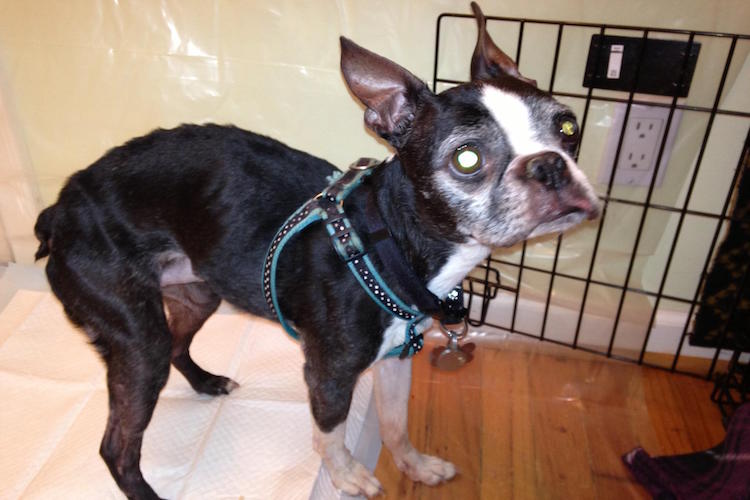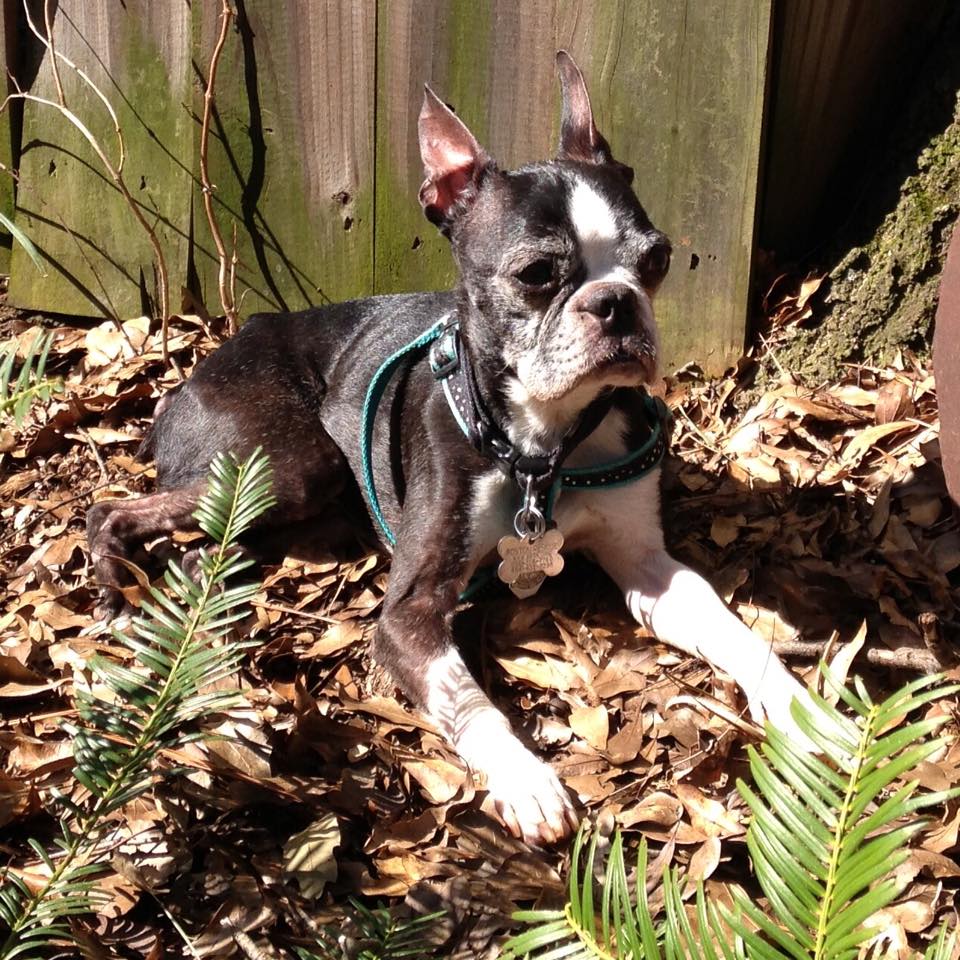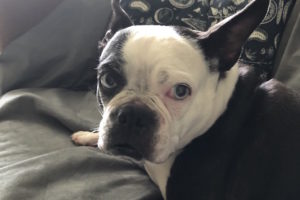Alabama Boston Terrier Rescue, the rescue with which I do most of my fostering, achieved their non-profit status in 2002, so they’ve been rescuing Boston terriers a long, long time. Scooby, an early rescue dog with this organization, was a handsome, feisty dog. After he repeatedly instigated fights with another male Boston in his home, he was re-homed to a family where he could be the only dog. 10 years later, he hit our radar as a dog in need. Although, we didn’t know it was Scooby at first. Let’s see if I can tell you this amazing story.
When You Want To Help And No One Will Let You
The first blip on the radar came from north Georgia. While out jogging, a young woman found a stray, senior Boston terrier and delivered him to a veterinarian’s office.
Through email, she reached out to ABTR for help, stating he appeared in bad shape, was very emaciated, with severe diarrhea. In addition, she’d had him scanned for a chip. The dog’s microchip registration was directed to a person in Alabama!
We immediately reached out to the veterinarian clinic with the goal of authorizing (and paying for) any emergent treatment needed to help this dog. Meanwhile, we contacted the microchip company to locate the owner of the dog.
Because this senior Boston terrier was also wearing a rabies tag, the veterinarian clinic quickly found the dog’s owner. Afterward, the clinic ceased communications with the rescue, for reasons of privacy, which is understandable. We were still worried.
We’d soon learn that one of our own was in trouble.
More on that microchip:
Shocker! The microchip was registered to a former administrator of our rescue organization. WHAT? With no record-keeping system in the early years, the team wondered who this dog might be. Through a series of texts and emails, we began to believe that Scooby was the stray dog in Georgia.
Access cut off, we had no way to help.
By now, we had no further access, no records, and no connection to the family that’d adopted Scooby 10 years prior. We felt powerless to help one of our own. It was awful.
A Lucky Little Dog, He Was
6 weeks later, Scooby shows back up on our radar.
My friends who operate The Rescue Ranch in Rutledge, Georgia happened to be at an area shelter picking up a female senior Boston terrier. During checkout, the shelter told them about a very emaciated, sick senior Boston terrier surrendered by its owner just 15 minutes prior. “You want him, too?” the shelter asked. “Yes, we do” was the reply.
Without a doubt, everyone in that room knew that if the Rescue Ranch didn’t pull him, the sick little dog wouldn’t live past closing. He’d be humanely euthanized at the close of business.
Facebook is a key platform to share rescue work with our supporters, especially work that involves dogs in shelters. As the Rescue Ranch shared their day’s experiences, the description of this dog’s condition sounded eerily familiar, and the location of the sick dog we tried to help 6 weeks prior was within proximity to the shelter’s jurisdiction.
Was this the same dog?
I reached out to Courtney, co-founder of the Rescue Ranch. “Can you scan him for a microchip?” I asked. “I think this is an ABTR dog, and if so, we’d like for him to come home.”
Sure enough, the chip number matched. It was Scooby.
Courtney and I made arrangements to meet the next morning. With Scooby settled in my car, Courtney gave me some advice: “If he acts like he needs to go, HE NEEDS TO GO.” His diarrhea was severe, urgent, and projectile.

The Verdict: Health Or Hospice
Scooby and I drove directly to the veterinarian. After a brief but thorough physical exam, our veterinarian was compassionate but direct: “We may be able to fix this, but he may be hospice.”
While waiting for lab work results to come in, I drove Scooby and his small basket of medications home. At this time, Scooby weighed 11 lbs. At a minimum, he should have weighed 18 lbs.
Making Space For A Sick Senior Boston Terrier
My foster home was considered “full” and I certainly wasn’t looking to foster more. The dynamics of the current foster group were such that adding another critter was out of the question. Plus, Scooby was in no shape to integrate. I had no available space for him, not to mention the mess I knew he would create.
I had one place I could put him.
My foyer became his new room.
My freshly painted foyer.
I experienced his diarrhea. Bloody, liquid, foul-smelling, explosive, and projectile. And frequent.
I gave Scooby a covered crate with plenty of cushioning inside to hopefully provide comfort to his protruding bones. I elevated the room’s temperature to help him stay warm. Food and water bowls completed the design, and I set the dimmer switch for low light. Because my office was adjacent to the foyer, it was easy to keep an eye on him.
Scooby immediately crawled inside the crate and curled up into a tight ball. Rarely did he come out of his crate that first week unless he needed to poop, eat, or drink water.
Never Too Old For A New Name
He was a good dog, but it didn’t seem he’d been told that much. It was pitiful; most of the time when he came out of to hurry and potty, he’d give me a sideways glance, finish, hang his head, and return directly into his crate.
Did he expect me to yell at him?
Quietly without looking at him, I began to roll up the now used paper pads and any other layer that became soiled. With all the dirty gone, I’d then lay down fresh, and re-dim the lights.
We repeated this routine about every hour and a half. He never sought interaction from me those first days. His eye contact was always fleeting, a sideways glance.
He Didn’t Want To Eat. Sick, or Depressed?
It was a challenge to get him to eat those first few days. I knew he didn’t feel good, but there seemed to be something else bothering him. Maybe grief. Maybe trust. Maybe depression – going through the motions of living as I nursed him better.
A part of me expected him to collapse and die. He was that sick. Thankfully, I could also see his crate from my bedroom doorway. I didn’t want to be too far away from him.
That Time He Gave Me Permission to Care
One morning, I was startled awake. It was 2. a.m. and Scooby was standing at my bedside, looking directly up at me. Not a sideways glance, but pure, direct straight-forward eye contact. He stared at me for about 5 seconds, and with that, spun around on all fours and pranced back to his crate. I firmly believe in that moment he let me know he’d made a decision to do something. Try. Trust. Live. Was it simply gratitude, acceptance, permission? Maybe.
A New Name for an Old Dog
Later that morning, I decided to give Scooby a new name. A strong name. After some research, I chose the name “Boone” which means “good” or “a blessing.” It suited him perfectly.
Achieving Wellness For This Senior Boston Terrier
With some determination, I was able to get access to Boone’s complete medical history from the veterinarian clinic contact stamped on the rabies tag.
The medical history, and lack thereof, helped to formulate an informal diagnosis of Irritable Bowel Disease, (IBD) symptoms presenting long ago. IBD is an awful disease, can be difficult to manage, and in some cases, is life-threatening or unresponsive to treatment.
Boone never had the opportunity until his arrival to receive any diagnostics or treatments. Sadly, some of the damage was irreversible.
For 6 months, Boone and I worked to stabilize his gut.
With irritable bowel disorders, the treatment plans are very individualized and any adjustments are minimal and slow.
For example, if we added a steroid, we’d have to wait before we changed the diet, or add or subtract a different medication. We needed to know what change made the difference in his current set of symptoms. Change, wait. Change, wait. His poop would be my guide. In fact, I can probably write a book on poop.
9 months after Boone arrived to my home, he finally hit his target low-end normal weight of 16 lbs. He never gained an ounce more. While he remained thin, his coat improved tremendously! It was no longer dry, dull, and flaky, but shiny, full, and healthy.
Long integrated into the general population, he brought his full personality – Boone was indeed a stinker even in his old age and could start a kerfuffle with a glance. I learned that perhaps it was me that started that kerfuffle by anticipating it and moving in to intervene. As a result, I’ve learned to recognize and handle group tension differently.

My Little Ambassador
Using my quarantine protocol, I “wallpapered” my foyer in Visqueen to provide protection and containment. Plastic went up 4 feet on all walls and it covered the hardwood floors, too. For the floor, I added a cheap blue plastic tarp. On top of the tarp, I placed old, tired, bedsheets. The next layer comprised of “chux” pads, washable bed pads my sister donated. Finally, I made a layer of disposable, paper pee pads.
Boone remained with me for the rest of his life. He became my little ambassador and joined me for public relations events for Boston terrier rescue. He was a crowd favorite, despite his aloof personality.
His knees were horribly unstable from old, torn ACLs and patellar issues, but he was born with grit, and he knew how to compensate his gate and stance to keep himself upright. Occasionally, he’d get a burst of energy and engage Levi, another foster dog, in a quick game of chase.
He wasn’t much of a lap snuggler, preferring to nestle up against my thigh. Many a morning I nursed my cup of coffee with Boone velcroed to my leg. Although his kisses were rare, they were so cherished, a reminder of that morning long ago when he decided to give me a chance.
Our final snuggle occurred at the veterinarian. His then recent diagnosis of congestive heart failure advanced rapidly, and in his gaze, I could see he was tired. That afternoon, my little man slipped away peacefully, velcroed to my thigh.
Pin Me!





